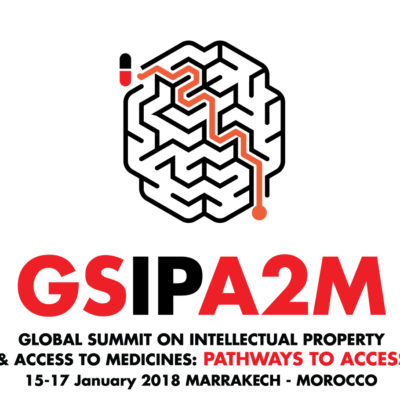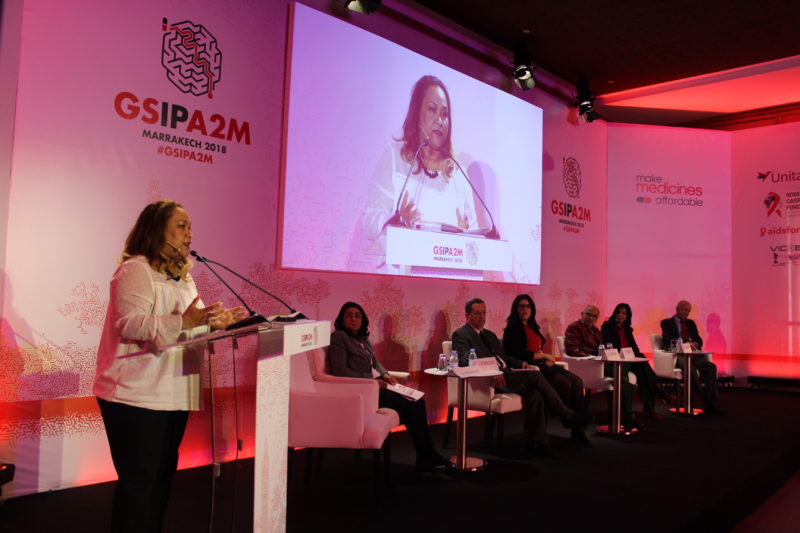 Our inaugural Global Summit on Intellectual Property and Access to Medicines has started today. Read Solange Baptiste’s welcoming speech below, the Global Director of the International Treatment Preparedness Coalition (ITPC).
Our inaugural Global Summit on Intellectual Property and Access to Medicines has started today. Read Solange Baptiste’s welcoming speech below, the Global Director of the International Treatment Preparedness Coalition (ITPC).
You can watch the summit live here and follow on Twitter via #GSIPA2M.
It is my sincere pleasure and honor to welcome you to the first ever community-led and community-organized Global Summit on Intellectual Property and Access to Medicines.
For those not as familiar with ITPC, we were established in 2003 in Cape Town, South Africa, at a time when less than 500,000 people had access to antiretroviral treatment given that it cost more than $10,000 per person per year. ITPC was born out of spirited activist discussions about how to expedite access to treatment to the millions of people living with HIV in the global South.

Our mission to enable people in need to access optimal HIV treatment, is guided by our holistic understanding that access to HIV treatment is a human right to health. Our work spans from direct treatment education, advocacy, community monitoring and research to interventions that increase access to affordable life-saving medicines.
Three years ago, Make Medicines Affordable (MMA) was set up by ITPC in partnership with FGEP in Argentina, ABIA in Brazil, The Network in Ukraine, AIDS Access in Thailand and I-MAK in the US under a joint project. The project aimed to reduce ARV prices in four middle-income countries by supporting health and public interest based law reform on intellectual property rights and the prevention of the adoption of TRIPS-plus provisions, and the use of TRIPS flexibilities such as patent oppositions, compulsory licenses.
We filed 9 oppositions and our interventions by the end of 2016, achieved approximately $695M in annualized cost savings in the four (4) countries. (Read more about the campaign’s highlights.)
MMA is a broad campaign that exists to increase access to treatment by removing market entry barriers for generic medicines by challenging patent monopolies.
In addition to the work done in these four countries, ITPC, in collaboration with many partners (many of whom are seated here this morning), in the Middle East and North Africa, Eastern Europe and Central Asia, Latin America and India has been conducting extensive work on community IP literacy, research and monitoring on IP laws and policies, proposing free trade agreements (FTAs), and holding big pharma to account for abusive patent and pricing policies.
These wins were achieved in a harsh environment for civil society, with depleting resources and on the backdrop of increasing global crisis
Together, we challenge international institutions like the WHO to do more, we challenge funders and donors and companies that use World Bank methodologies based on artificial indicators like GDP numbers to exclude patients from accessing treatment. We challenge the status quo.
Under MMA, we have grown our implementation from four countries at the launch of the project, to 26 countries across 4 regions – Africa, Asia, Eastern Europe and Central Asia and Latin America. (See where we work.)
These wins were achieved in a harsh environment for civil society, with depleting resources and on the backdrop of increasing global crisis. The world has changed. Things were difficult before, but a whole new level of challenge has unfolded for people living with HIV and for civil society as a whole. The populism sweeping Europe and the US is resulting in a new brand of politics and “alternate facts” that is rescinding on environmental commitments, closing down borders, and reducing aid spending. Already, funding and political will to end AIDS was withering on the vine. Now there is a palpable sense of crisis.
Middle-income countries are now at the mercy of patent holding companies that are charging high prices not just for HIV treatment but for other diseases as well. These countries are excluded from funding and are labelled as transition countries. But can we be frank for a moment? These are not transition countries they are exclusion countries!
These are not transition countries they are exclusion countries!
Middle-income countries are also excluded from voluntary mechanisms promoted by big pharma and are under tremendous pressure to negotiate FTAs with developed countries.
The crisis in MICs is exacerbated when we look beyond HIV and Hep C and at all diseases – just think about the courageous advocacy of women with breast cancer against Roche.
Global discussions around universal health care seem laughably out of touch when governments and patients are still paying exorbitant prices for medicines.
It is against this raging tide that communities stand in defiance of the corporate control of medicines and science. The extent of work and expertize of civil society organizations and the critical role they play in balancing WTO mandated IP rules with public interest and public health, while also resisting the onslaught of TRIPS-plus measures, is sorely under-recognized and under-resourced.
If we have learned anything over the past years, it is that no one organization or sector can fight this tide. This IP summit represents a critical moment in history for the emergence of a unified global community-led movement of activists who change the systems and make it work for us all! The agenda has been designed to facilitate this process. So, this means you should be experiencing discomfort while here – you need to push your thinking, challenge your preconceptions, share your experiences, engage in uncomfortable but constructive debates with your colleagues, ground your ideas and make this Summit your own!
In 1994, the establishment of the WTO, the signing of the TRIPS Agreement and the establishment of a “rules based trading system” was hailed by many as a beacon of light particularly for developing and least developed countries…but these rules have for almost 25 years… benefitted and grown corporate power to an extent that could not have been imagined by the original negotiators. Almost as soon as the system was established, its impact on access to treatment and the right to health became painfully apparent. With new free trade agreements, they threaten to become greatly expanded and even further entrenched.
This summit is an opportunity to reflect on our journey… from Veriano to Alia, we are back in Marrakech fighting this same system. A system that prioritizes profits over people is disastrous for us all! Let us not forget that this same system killed our friends who tragically died because they could not afford the medicine they needed to live.
HIV is a virus, but this system is a super virus.
HIV is a virus, but this system is a super virus. This system adapts, this system mutates, this system resists. We are still grappling with this same debilitating system, still fighting 23 years later, an entire generation.
This IP summit is a critical moment in history for the emergence of a unified global community-led movement of activists who can shake this system, beat it into submission and force it to work for us all! Our Summit is not just a sobering reality check but a call to wake up and act on a more radical and ambitious agenda TOGETHER.
The value of being here is not just for a warm fuzzy feeling reflecting on our victories, but to tap into that same frequency, impetus and solidarity that led us to urgent, united, global, regional, national but most importantly grassroots action almost two decades ago. If not now, when? If not us…who?
Update: You can now read our round-up story on the conference: Fixing the patent system – from Marrakech and back again.




